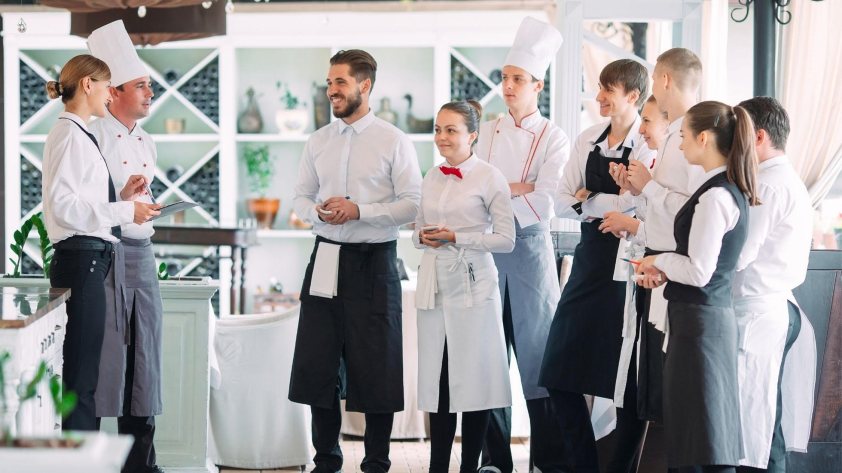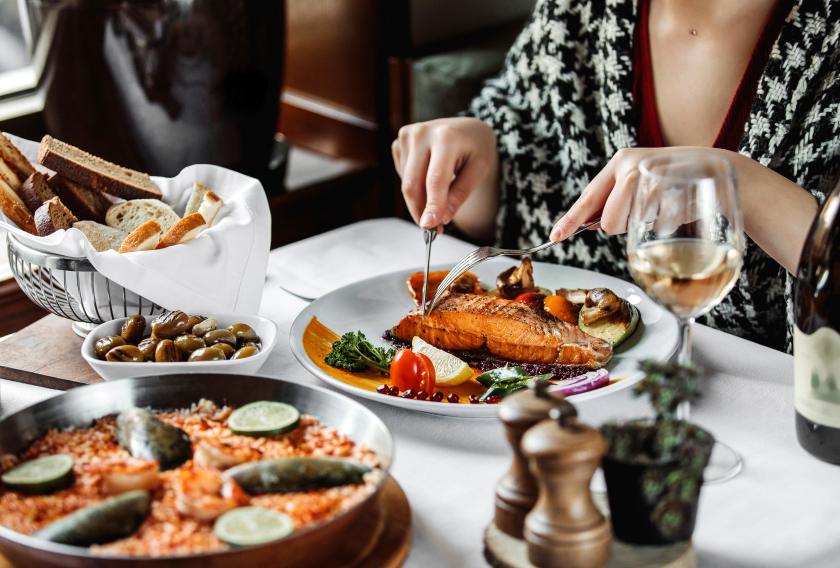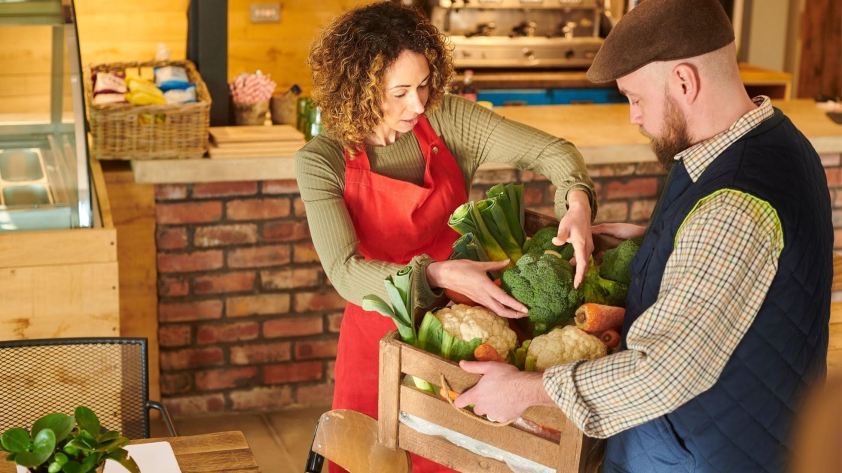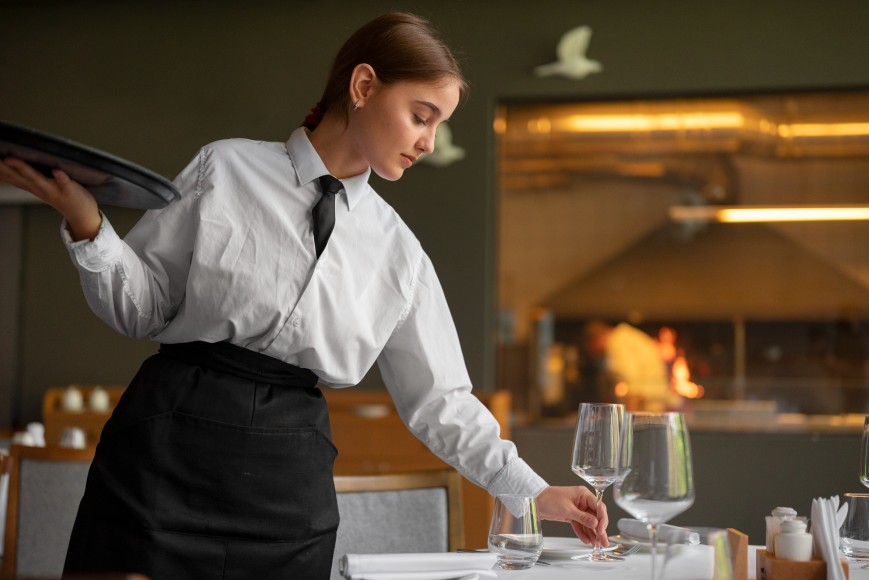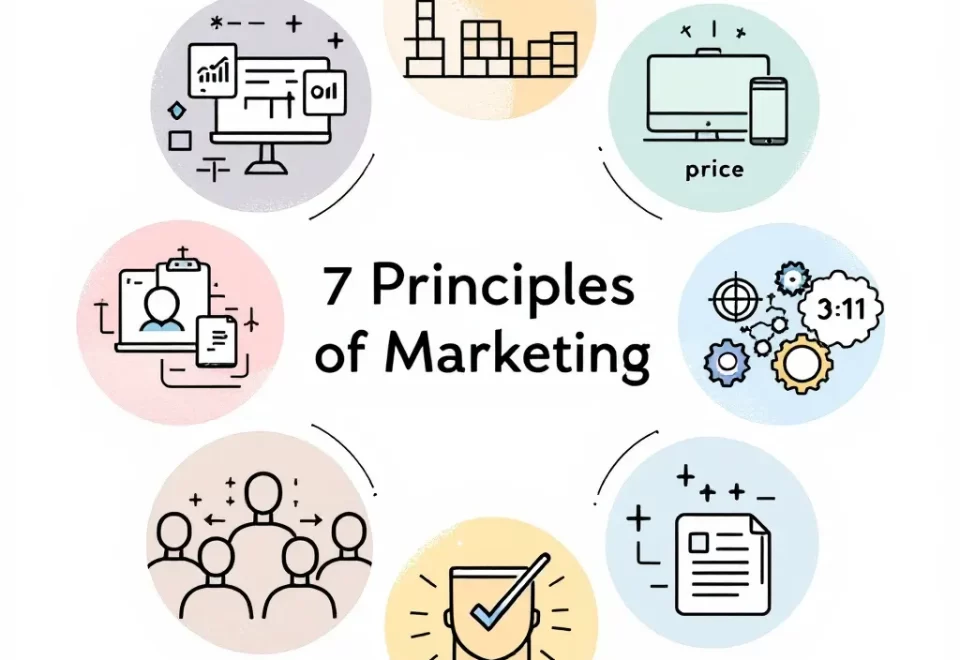The food industry, without a doubt, thrives on its deep-rooted connection to culture, tradition, and personal stories. As the world shrinks into a global village, restaurants of every size are presented with the challenge of engaging local customers while also appealing to a worldwide audience.
In the dynamic culinary world, ‘thinking globally and acting locally’ is more than just a catchphrase; it’s a recipe for success. In this post, we’ll dive into how restaurants can adopt effective marketing strategies that capitalize on local charm while taking a global perspective.
1. Start with Authentic Storytelling
In the age of information saturation, what makes one restaurant stand out from another? Often, it’s not just the quality of food but the story behind it. Authentic storytelling taps into the emotional, nostalgic, and personal experiences of both the restaurateur and the customer, making it a powerful tool in the restaurant marketing arsenal.
- The Origin Story: Every restaurant has a beginning, a reason it was conceived. Whether it was the culmination of a lifelong dream, a family tradition passed down through generations, or an inspiration from travels, sharing this story creates a deep-rooted connection with patrons. For example, a restaurant might have started because of a chef’s vivid childhood memories of cooking alongside their grandmother. This narrative is not just about the food; it’s about family, tradition, and cherished moments.
- Journey of the Dish: Beyond the menu descriptions, the journey of each dish from concept to plate can be an enthralling tale. Highlight the challenges faced in perfecting a recipe, the history behind a traditional dish, or the innovative thought process that resulted in a fusion delicacy. Sharing these insights offers customers more than just a meal – it provides an experience.
- Spotlight on Team Members: Your team, from the head chef to the servers, each have unique backgrounds and stories. Showcase these personal journeys. Perhaps your bartender was a former architect who now crafts drinks inspired by famous structures, or your sous chef draws from her multicultural upbringing to infuse dishes with flavors from around the world. By humanizing and highlighting your staff, you not only value their contributions but also present relatable figures to your customers.
- Incorporate Customer Stories: Engage with regular customers and document their experiences and memories associated with your restaurant. Maybe a couple had their first date there, or a family celebrates every reunion at your establishment. These personal anecdotes resonate with potential patrons, making them feel a part of a larger community.
- Use Visual Storytelling: While written stories have their charm, the adage “a picture is worth a thousand words” holds true, especially in the food industry. Use photographs, videos, and other visual content to complement your narratives. This could be a time-lapse of a dish being prepared, candid shots of happy customers, or even behind-the-scenes glimpses of the hustle and bustle of the kitchen.
Authentic storytelling isn’t about embellishing facts or crafting a fictitious narrative. It’s about presenting the genuine, heartfelt stories surrounding your restaurant marketing guide. By effectively communicating these stories, you’re not merely selling dishes; you’re offering memories, experiences, and a slice of life that patrons will cherish and come back to.
2. Harness the Power of Digital Platforms
In today’s digital age, the online realm provides an expansive platform for restaurants to engage with both their local community and the broader global audience. Leveraging these platforms is key to scaling the reach of your restaurant’s brand.
Social Media:
- Instagram: Renowned for its visual appeal, Instagram is perfect for showcasing mouth-watering dishes, behind-the-scenes looks, and sharing your restaurant’s story. Using Instagram Stories, reels, and IGTV can provide a holistic view of your culinary journey and engage followers in real-time.
- TikTok: This platform is a goldmine for viral content. Quick recipe videos, fun challenges related to food, or showcasing a day in the life at your restaurant can make waves. The app’s algorithm is known to favor engaging content, giving even smaller restaurants a chance to go global. Gen Z food and dining trends are also a key focus on the platform, with this generation prioritizing sustainability, plant-based options, and unique, Instagram-worthy dining experiences. Engaging with these trends can help attract a younger, socially-conscious audience eager to explore new and innovative food concepts.
- Facebook: It remains a pivotal platform, especially for event promotions, customer reviews, and community building. Facebook’s ad system allows for targeted promotions, ensuring you reach your desired audience.
Online Reviews:
- Yelp & TripAdvisor: These platforms are especially influential for tourists and visitors. So, if you want to leverage the power of travel marketing, you should definitely have your restaurant listed on those 2 sites. Encouraging satisfied customers to leave positive reviews, and responding promptly and professionally to any negative feedback, can bolster your restaurant’s reputation.
- Google My Business: Claiming and optimizing your restaurant’s Google My Business listing can increase your visibility in local searches. Regularly updating photos, menu items, and responding to reviews can keep your profile engaging.
Restaurant Reservation and Delivery Platforms:
- OpenTable, Resy, and Bookatable: These platforms not only streamline the reservation process but also often feature reviews and ratings, further emphasizing the importance of maintaining top-notch service.
- UberEats, DoorDash, and Grubhub: If you offer delivery, partnering with popular platforms can expand your reach, especially to those who prefer dining in. Regular promotions or special menu items can keep your restaurant trending on these platforms.
Blogging and Content Creation:
- Regularly updating a blog section on your restaurant’s website can boost SEO, driving organic traffic. Share articles about the origins of your dishes and making sure they’re SEO compliant, can truly add value to your marketing strategy. This not only positions your brand as a thought leader in the culinary world but also helps engage readers on a deeper level.
Email Marketing:
- Building a database of your customers and sending them regular newsletters can keep them engaged. Exclusive offers, updates about upcoming events, or simply sharing a behind-the-scenes look can make customers feel valued and connected. Crafting a B2C email marketing sequence can do wonders for restaurants when it comes to table bookings.
Need help implementing our winning marketing strategies for restaurants and serve success?
Contact Growth Hackers
3. Partner with Local Producers
In a world where consumers are becoming increasingly conscious of where their food comes from, partnering with local producers offers a wealth of advantages for restaurants, from ensuring freshness to building trust within the community. Here’s a deeper look at the multifaceted benefits and strategies of forging these partnerships:
- Authenticity and Freshness: By sourcing ingredients from local farms and markets, restaurants guarantee freshness. Fresh ingredients enhance the taste and overall quality of dishes. For instance, using tomatoes picked at the peak of ripeness or freshly-caught fish can elevate a meal from good to unforgettable.
- Building Trust and Transparency: When customers know where their food is coming from, it instills a sense of trust. Restaurants can take it a step further by sharing stories or backgrounds of these local producers on their menus, websites, or social media. Highlighting a family-owned dairy farm or an organic vegetable grower allows customers to feel a personal connection to their meal.
- Promote Seasonal Menus: Local sourcing often means embracing seasonal produce. This can lead to innovative, rotating menus that highlight the best of each season. For example, a summer menu might feature a strawberry-spinach salad, while a winter menu could have a hearty root vegetable stew. Holiday menu ideas not only provide variety but also pique the interest of regular patrons looking forward to the next culinary delight.
- Support the Local Economy: Collaborating with local producers means you’re investing back into the community. This not only creates goodwill but can also lead to collaborative marketing efforts. A local vineyard, for instance, might promote your restaurant as a preferred venue to enjoy their wines.
- Organize Farm-to-Table Events: Hosting special events that celebrate local producers can be a hit. Imagine a ‘Farmers’ Appreciation Night’ where dishes are crafted exclusively from ingredients provided by local partners. Such events can draw crowds and media attention, providing excellent marketing opportunities.
- Reduced Carbon Footprint: Sourcing locally means reduced transportation needs, leading to a lower carbon footprint. This is a significant selling point, especially for the environmentally-conscious consumer. Promote your commitment to sustainability through your local partnerships.
- Collaborative Marketing: Joint marketing campaigns or events with local producers can mutually benefit both parties. Whether it’s hosting wine tasting nights with a local vineyard, or offering exclusive discounts when customers purchase from both the restaurant and a partner farm, there are numerous collaborative opportunities to explore.
Incorporating local producers into a restaurant’s supply chain is more than just a logistical decision; it’s a marketing strategy, a commitment to quality, and an investment in the community. By effectively leveraging these partnerships, restaurants can enrich their culinary offerings, deepen connections with their customers, and contribute to a more sustainable and interconnected local ecosystem.
4. Organize and Participate in Events
Engaging directly with both your local community and a broader audience through events is a dynamic way to enhance your restaurant’s visibility and reputation. These gatherings become pivotal touchpoints where you can demonstrate your culinary flair, share your restaurant’s narrative, and craft unforgettable moments.
Participation in local food festivals introduces your brand to newcomers and provides a testing ground for new menu items. An enticing stall, complemented by bite-sized samples and perhaps a promotional giveaway, can become a crowd favorite. Meanwhile, hosting or joining culinary workshops underlines your position as a culinary thought leader, drawing enthusiasts who might evolve into fervent brand advocates. The networking events at these types of venues can bring potential customers, employees, investors and partners. If your restaurant boasts a unique dish or a distinct cooking technique, a workshop revolving around that can be both educational and engaging.
On a grander scale, marking your presence at international food fairs exposes your brand to a global audience. It’s a chance to woo international tourists, potential franchisees, and even foster collaborations. Offering dishes emblematic of your brand and networking extensively at such platforms can yield long-term dividends.
For those evenings when routine feels too monotonous, themed nights can inject excitement. Imagine the allure of a ‘Mexican Fiesta’ evening where not only the menu but the ambiance, from decor to music, immerses diners in a different world. Such nights, when well-publicized, can attract both regular patrons and fresh faces.
Speaking of collaborations, forging alliances with local businesses for combined events can prove fruitful. A joint venture with a local winery or a bookstore can introduce both brands to a shared audience, expanding reach and forging community ties. And let’s not forget the charm of celebrating seasonal and cultural milestones. By offering specialized menus during festivals like Chinese New Year or Diwali and coupling it with relevant decor and cultural performances, your restaurant becomes a hub of celebrations.
Lastly, the allure of pop-up restaurants shouldn’t be overlooked. Setting up a temporary culinary venture in a picturesque locale, like a beach or a vineyard, guarantees exclusivity. Promoted as a unique dining escapade, it’s bound to draw attention and rave reviews.
To encapsulate, events are about more than just food. They’re a blend of flavors, stories, and experiences. In our digitally connected era, the ripples of a well-hosted event can travel far and wide, placing your restaurant on both local and global radars.
5. Leverage Your Team’s Potential
Your team – from the sous chef meticulously preparing ingredients to the front-of-house staff greeting every guest with a warm smile – plays a pivotal role in the day-to-day success of your restaurant. Beyond their daily duties, they carry stories, insights, and an intimate knowledge of your establishment. Turning your staff into brand ambassadors can be the key to creating a genuine and effective marketing strategy.
Personal Stories Create Connections
Every staff member has a story. The journey of your chef from culinary school to your kitchen, the favorite dishes of your servers, or the funny anecdotes from your bartender – these tales can humanize your brand and foster connections with your audience. Sharing these stories on your social media platforms, newsletters, or even on a dedicated section of your menu can offer guests a unique insight into the heart of your restaurant.
Train and Empower
The Culinary CMO understands the untapped prowess your team holds. By offering specialized training, they can transform your staff into brand ambassadors. When your team is well-versed with the intricacies of marketing, they can actively engage with customers, seek feedback, promote special events, and even generate user-generated content for social media.
Savor your restaurant’s success with our tailored marketing strategies!
Encourage Creativity
Your team interacts with guests daily and thus has a better grasp of the local palate and trending flavors. By fostering an environment of open communication, you can harness their insights to innovate in the kitchen. A dish co-created with a server or a special cocktail inspired by the bartender can be marketed as limited-time offerings, driving curiosity and footfall.
Equip with Tools and Checklists
The Culinary CMO is dedicated to equipping your team with essential marketing tools and skills. Through a detailed checklist, they can guide your staff in capturing behind-the-scenes moments, collecting customer testimonials, and even managing online reviews. This hands-on approach ensures consistency in marketing efforts and maximizes reach.
Celebrate Successes
Acknowledge and celebrate the marketing successes and milestones achieved by your team. Whether it’s a well-received post shared by a staff member or a successful event they helped promote, recognizing their contributions can motivate and foster a sense of ownership.
Incorporating The Culinary CMO’s Approach
The Culinary CMO’s strategy is rooted in the belief that your restaurant’s marketing success lies within its walls. By adopting their approach, you’re not just externally hiring a marketing team; you’re nurturing one from within. This organic strategy guarantees that your brand’s voice remains genuine, connected, and resonates both locally and globally.
In essence, leveraging the potential of your team is about recognizing their value beyond their designated roles, empowering them with the right tools and training, and fostering an environment where creativity and innovation are celebrated. The result? A marketing strategy that’s as authentic and diverse as your team.
The Key to Great Restaurant Marketing Strategy
Engaging locally while serving globally is a delicate balance of understanding your roots and embracing the vastness of the culinary world. With the right strategies, it’s possible to carve a niche for your restaurant, making it a local favorite and a catalyst of great growth. The key lies in authentic storytelling, leveraging digital platforms, embracing local partnerships, and unlocking the potential of your team.
As you chart your marketing journey, remember to be adaptive, innovative, and always serve with love. Whether you’re a quaint cafe in the heart of Paris or a bustling diner in New York, there’s a world out there waiting to taste what you have to offer.
Growth Hackers is recognized as one of the top restaurant marketing agencies helping restaurant owners with their branding, table bookings and events. If need help putting your restaurant on the map, do not hesitate to reach out to Growth Hackers today so we can evaluate how we could help you grow.

